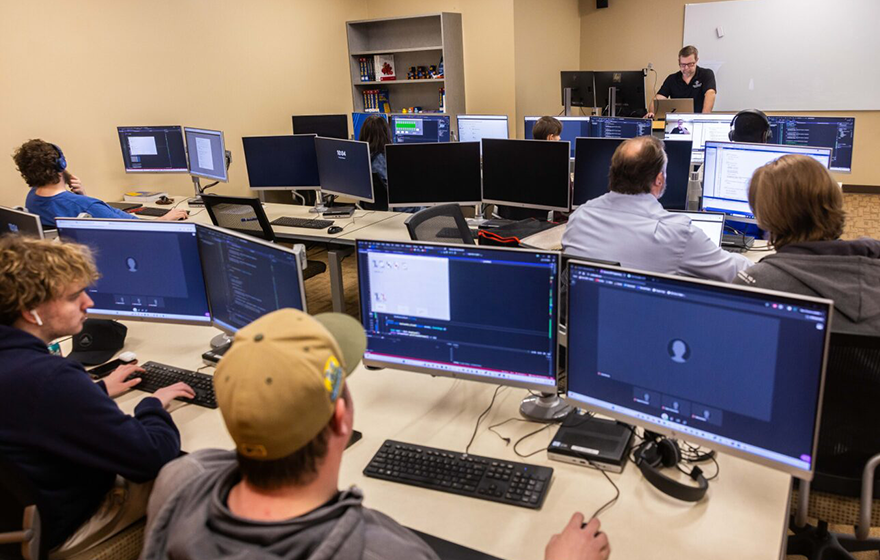Discover the Advantages of Nearshore Software Development for Your Team
Discover the Advantages of Nearshore Software Development for Your Team
Blog Article
Devoted Developers vs. In-House Teams: Which Is Right for You?
The decision between using specialized programmers and maintaining an in-house team is a significant one that can impact the trajectory of your tasks and overall company technique. Alternatively, internal groups add to a cohesive company culture and a nuanced understanding of long-term goals.
Comprehending Committed Programmers
The expanding need for specialized abilities in the technology market has caused the introduction of committed programmers as a viable solution for several organizations. These professionals are typically gotten on a job basis, allowing companies to leverage details know-how without the long-term commitment related to full-time hires. Dedicated developers are often embedded within a client's group, supplying versatility and scalability to meet project requirements.
This version permits companies to access a global ability pool, which is especially beneficial in a quickly evolving technical landscape. Committed designers can be sourced from different geographical places, ensuring that firms can find the best ability set at affordable prices. They typically bring a wide range of experience and expertise, having actually serviced diverse jobs across different markets.
Furthermore, specialized developers can concentrate exclusively on the jobs handy, enhancing efficiency and efficiency. They are geared up to incorporate perfectly right into existing operations, collaborating closely with internal teams to attain job objectives. This method not just lowers the worry of recruitment and training however additionally enables organizations to continue to be nimble, adapting rapidly to transforming market needs and technical innovations.
Benefits of In-House Teams

Furthermore, internal teams often tend to have a deeper understanding of the firm's mission, values, and goals. This alignment can improve worker engagement and motivation, as employee really feel much more attached to their job and the organization's success. Additionally, having a devoted in-house group enables for far better positioning of techniques and goals, as these members are continually focused on the company's top priorities.
In-house teams likewise promote quicker decision-making procedures, as they can respond extra swiftly to challenges and adjustments. The recognized connections and knowledge with company procedures permit structured workflows and reduced miscommunication. Eventually, the mix of a cohesive society, placement with business objectives, and efficient interaction makes in-house teams a useful asset for several organizations, specifically those wanting to grow long-term growth and development.
Expense Considerations
When assessing expense considerations, both devoted programmers and in-house groups present unique monetary implications for companies. Involving committed developers typically includes a pay-per-project or per hour price model, which can be affordable for companies with rising and fall task demands. This strategy allows for adaptability in scaling resources up or down, making sure that firms just pay for the solutions they need.
In comparison, internal groups require dealt with expenses, consisting of wages, benefits, and overhead expenses such as office area and equipment. While this version provides higher control and prompt accessibility of resources, it might bring about greater long-lasting costs, particularly if the work does not warrant a full-time team.
Moreover, companies must think about the concealed prices connected with employment and training of internal workers, which can even more stress budgets. Sometimes, the moment and resources invested on managing an in-house group can interfere with the company's core company objectives.

Project Monitoring and Flexibility
Project administration and versatility are critical variables that influence the selection between internal teams and specialized programmers. Devoted teams usually have established processes for handling tasks properly, leveraging details techniques like Agile or Scrum, which facilitate iterative development and versatility.

Eventually, the option between internal groups and devoted developers depends upon the desired degree of versatility and the specific job administration needs. Business should evaluate their functional characteristics, task intricacy, and resource schedule to identify which option straightens finest with their strategic goals.
Making the Right Choice
Choosing the ideal development strategy-- internal groups or specialized programmers-- requires a careful analysis of numerous aspects that straighten with a company's tactical objectives. nearshore software development. Initially, take into consideration the nature of the job. Dedicated programmers may be much more suitable if it requires specialized abilities or a fast scale-up. Conversely, in-house groups can provide much better continuity and assimilation with existing personnel.
Following, examine your spending plan. Committed designers typically present a cost-effective service for temporary jobs, while internal teams may sustain higher long-term expenditures because of wages, benefits, and expenses costs. Examine the degree of control and partnership wanted; in-house groups normally cultivate more powerful communication and placement with firm culture.
If instant results are essential, specialized designers can be onboarded rapidly, whereas developing an in-house group takes time for recruitment and training. If continual advancement is vital, spending in an in-house group may produce better returns over software development partner time.
Conclusion
Finally, the decision in between devoted programmers and in-house groups hinges on project needs and business objectives. Devoted developers supply adaptability and specific expertise, making them appropriate for temporary initiatives. On the other hand, internal teams cultivate a natural culture and deeper positioning with lasting goals. Careful assessment of budget plan restrictions, task timelines, and wanted control degrees is important for figuring out the most proper strategy, making certain alignment with strategic concerns and functional performance.
The choice in between making use of dedicated developers and maintaining an in-house team is a significant one that can impact the trajectory of your jobs and general company method.Job administration and versatility are important variables that affect the option between specialized designers and in-house teams. software engineering staffing.In contrast, in-house groups might stand out in preserving a consistent project monitoring framework due to their knowledge with the company's culture and long-term objectives. Devoted developers commonly offer a cost-effective solution for short-term tasks, while in-house groups may sustain greater long-lasting expenses due to wages, advantages, and overhead prices.In final thought, the decision in between in-house groups and specialized programmers hinges on project needs and business purposes
Report this page